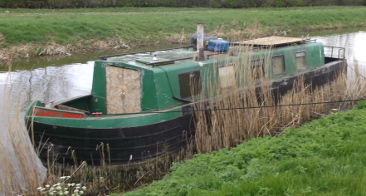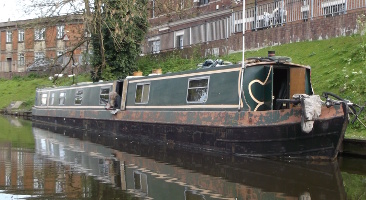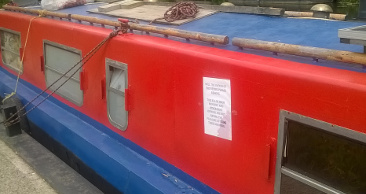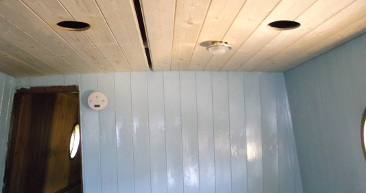THE wintry wet and windy weather continued throughout Spring into Summer, the constant rain lashing the Fens with the odd dry day. So much for global warming, the Fens just had the wettest June on record with more than double the monthly rainfall.
The torrential, thundery downpours on some days being so heavy that waterproofs became useless as the rain hammered straight through the fabric. The strong south westerly winds in February and March caused other problems down at the St Germans Pumping station, when the force of wind pushed water down the Main Drain to rise up against the pumping station.
This led to the water level sensors giving false readings which in turn tricked the automated systems in to believing that the water levels were very high so switched on the pumps. As the water levels dropped below normal many boats were sitting on the bottom. When water levels return to normal levels, some boats were sunk when they became wedged under their moorings.
 Influx of over-stayers
Influx of over-stayers
Over the winter months they has been an influx of free-loading supporters of the anarchist boater group National Bargee Travellers Association (NBTA) who have been chased off both Canal & River Trust and Environment Agency waters.
 Unlike the rest of us on the Middle Levels who either own their moorings or have marina berths. These free-loading boaters moor where their like, for as long as they like. A public mooring time limit has no meaning to them. Unlike the canals which have towpaths where boats can moor, on the Middle Level rivers, the banks are privatively owned. Mooring is not permitted unless the boater has permission from both the bank owner and the Middle Level Commissioners. The Commissioners have been inundated with complaints from the riverbank owners about these boaters mooring on their land. Across the system the Commissioners believe that there are about 60 boats without legal moorings.
Unlike the rest of us on the Middle Levels who either own their moorings or have marina berths. These free-loading boaters moor where their like, for as long as they like. A public mooring time limit has no meaning to them. Unlike the canals which have towpaths where boats can moor, on the Middle Level rivers, the banks are privatively owned. Mooring is not permitted unless the boater has permission from both the bank owner and the Middle Level Commissioners. The Commissioners have been inundated with complaints from the riverbank owners about these boaters mooring on their land. Across the system the Commissioners believe that there are about 60 boats without legal moorings.
 Licences to be introduced
Licences to be introduced
The Middle Level Commissioners, therefore, are looking at obtaining a Private Act of Parliament, costing about £60,000—to replace the current laws they are working to—some of which date back back to 1704. One of which currently prevents the blocking of uninsured boats from entering the system. To pay for the patrol officers, licences are to be introduced.
 Subject to parliamentary time the new laws could come into force by the end of 2017, with licences in the spring of 2018. The IWA are very keen on this, Seeing it as the first stage of the Middle Levels becoming part of an Greater CaRT empire.
Subject to parliamentary time the new laws could come into force by the end of 2017, with licences in the spring of 2018. The IWA are very keen on this, Seeing it as the first stage of the Middle Levels becoming part of an Greater CaRT empire.
Fenland Council is also applying for the same powers that East Cambridgeshire Council has on the Ely riverside moorings. Over-stayers on the council moorings in March and Whittlesey will find themselves being fined for every day they overstay. As with the Ely riverside moorings, the fines will be enforceable.
Refitting
As spring was too wet for boating for many people, quite a number of us in the marina including your scribe have used the time to carry out part refits.
In the case of myself, the need to replace the stove which developed a crack in the corner of the top plate. The opportunity was taken to swap round the galley and saloon. With the galley moved to the front of the boat. The inside of the boat was stripped back as far as the bathroom bulkhead given a clean sheet to work with. The centre of the celling frame was lowered to a flatter curve which removed the effect that the steeply curved celling give of the cabin looking narrower. Unless you are over 6ft 2in you will not bump your head on the ceiling, the extra space allowing for more insulation.
 All timber was treated before-hand with a flame retardant liquid which should slow down the spread of fire, which is well worth the £150 it cost! For I know from experience that the flame retardant treatment works. Back in 1996 I had a kitchen fire, the house was saved because the kitchen's wooden celling had been treated with a flame retardant which slowed down the spread of the fire allowing time for the fire brigade to arrived and put the fire out and save the house.
All timber was treated before-hand with a flame retardant liquid which should slow down the spread of fire, which is well worth the £150 it cost! For I know from experience that the flame retardant treatment works. Back in 1996 I had a kitchen fire, the house was saved because the kitchen's wooden celling had been treated with a flame retardant which slowed down the spread of the fire allowing time for the fire brigade to arrived and put the fire out and save the house.
If you are either fitting-out or refitting you should consider using flame retardant treatment. As with any major changes you will have to have a new boat safety examination even if it is not due.
Walking the dog along the working railway
Being a cat owner, I don't have the chore of having to take them for a walk unlike a dog owner. But where you walk the dog is important. Taking it for a walk along a railway line not a good idea for you never known when the next train will come along. Some freight lines only see a train once a month.
The fact the rail head surface is oxidised (rusted) does not mean that it is disused. It takes less than a week for the rail head to completely oxidise over. A few weeks ago our editor and Jan took a walk along the Churnet Valley Railway and could have been run-down by a works train had one been timetabled for that day on that section of line.
 The railway company has had a major problem with trespass in area. One local dog owner tried to have the railway made a public footpath a few years ago. Trespass is a major problem for the rail network and the cause of many train delays. The Transport Police deal with over 25,000 cases each year. The only safe railway line you can walk along is one with the track having been removed.
The railway company has had a major problem with trespass in area. One local dog owner tried to have the railway made a public footpath a few years ago. Trespass is a major problem for the rail network and the cause of many train delays. The Transport Police deal with over 25,000 cases each year. The only safe railway line you can walk along is one with the track having been removed.
